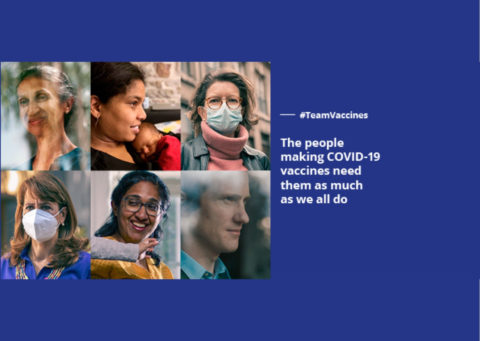Vaccines are one of the most effective and cost-efficient medical technologies ever developed. Except for clean water, nothing has had a larger effect on global health than vaccines, especially for children.[1] Before COVID-19, even if vaccines saved millions of lives every year, they had become a routine and unremarkable part of life. Their benefits are so embedded in our lives that it is easy to take them for granted. But we must never forget how remarkable vaccines can be, from the benefits they can provide at every stage of life, to their future potential to stay ahead of global health threats.
The benefits of vaccination throughout life
Innovation in vaccines has led to the prevention of over 30 diseases, including malaria, pneumonia, Ebola and HPV-related cancers.
In recent decades, thanks to vaccines, many people have never had to worry about catching smallpox or fear paralysis caused by polio. Most recently, they have helped protect us and our families from COVID-19 by preventing serious illness and deaths, protecting our healthcare systems and frontline healthcare workers. COVID-19 vaccines allowed us to reconnect with those we love, reopening schools and our economies, and ultimately overcome the largest global pandemic in our lifetime.
Vaccines can provide benefit to people of all ages, at every stage of their lives. Vaccinated children are less likely to miss school or have long-term disabilities caused by vaccine-preventable diseases. Adults are less likely to miss work due to illness, making them more likely to actively contribute to society for longer.[2] Furthermore, with the rapidly ageing population, vaccines are playing a key role to keep people healthy from adulthood to old age.
Widespread vaccination can also result in less hospital admissions. By helping alleviate the pressure on hospitals and healthcare workers, vaccines play a critical role in freeing up capacity so that patients with other chronic conditions, such as cancer or diabetes, can be treated.
Vaccines can also help slow the impact of antimicrobial resistance (AMR) by preventing bacterial infections in the first place, reducing the need for antibiotics and slowing the emergence of ‘superbugs’, and help keep people safe.
The risks of low vaccination rates
While the world has been focused on COVID-19 vaccines, the disruptions to education and healthcare systems have meant that many people have not received the routine vaccines they need during the pandemic.[3] Data from the WHO and UNICEF found that 23 million children missed out on basic vaccines through routine vaccination services in 2020. Approximately 3.7 million more children compared to 2019.[4] 2020 could be the first time in 28 years that the world has seen a drop in yearly childhood vaccinations.[5]
To reverse this worrying trend, people of all ages should protect their health by catching up on vaccinations they may have missed during the COVID-19 pandemic. Conducting catch-up campaigns, restoring and strengthening routine immunization will be critical. Governments, funders, organizations on the ground, as well as our industry should exchange on best practices, and apply lessons learned from COVID-19 to strengthen health systems and reach more people with lifesaving and highly cost-effective vaccines.
The future potential of vaccines
In the past two years, we have seen major advances in science and new vaccine technologies. Together with the scientific community, we are working to improve existing vaccines to provide better and longer protection, creating new formulations, combining vaccines to make it easier to reach people.
We are developing new vaccines to help prevent from more known viruses but also rapid response platforms to develop vaccines against “Diseases X”, diseases for which we will know very little when they emerge. We are exploring new technologies to make vaccines more heat-stable, making them easier to transport and store.
We are reducing manufacturing complexities and developing new methods which will help us adapt and quickly expand capacities. And finally, we are also finding new ways to distribute vaccines more efficiently, addressing remaining roadblocks during the “last mile” to reach every child, adolescent or adult who needs to be vaccinated.
Today, there is a promising vaccine pipeline, with 260 new vaccines being developed to protect against several diseases and pathogens which lack effective vaccines, including HIV, Norovirus, Alzheimer’s disease, Lyme Disease, Respiratory Syncytial Virus (RSV), and Group B streptococcus. On the horizon are vaccines for mosquito-borne illnesses like Zika or dengue.
By constantly improving how vaccines are made and distributed, it will be easier for everyone, everywhere to benefit from their protection and lower health inequities and to stay one step ahead of emerging threats, protect communities from fast-spreading outbreaks, and even avoid future pandemics.
A better life possible for everyone
The COVID-19 pandemic has shown that when we work together, we can achieve more than we ever thought possible. But there is more to be done. Together we can give a boost to vaccines, making an even greater impact to our health, to our communities, and to our world.
On the occasion of World Immunization Week (24-30 April 2022), the global biopharmaceutical industry is launching #VaccinesForLife to celebrate the lives vaccines allow us to live and the promise they provide for the future. Learn more on the #TeamVaccines website.
[1] https://www.ncbi.nlm.nih.gov/pmc/articles/PMC2083746/
[2] https://www.abpi.org.uk/value-and-access/vaccines/economic-and-societal-impacts-of-vaccines/
[3] https://www.who.int/news/item/17-11-2021-global-leaders-call-for-cervical-cancer-elimination-on-day-of-action
[4] https://www.unicef.org/press-releases/covid-19-pandemic-leads-major-backsliding-childhood-vaccinations-new-who-unicef-data
[5] https://backslashcoding.com/work/old_ifpma/resource-centre/call-to-action-on-routine-and-life-course-immunization-in-the-context-of-the-covid-19-pandemic/










